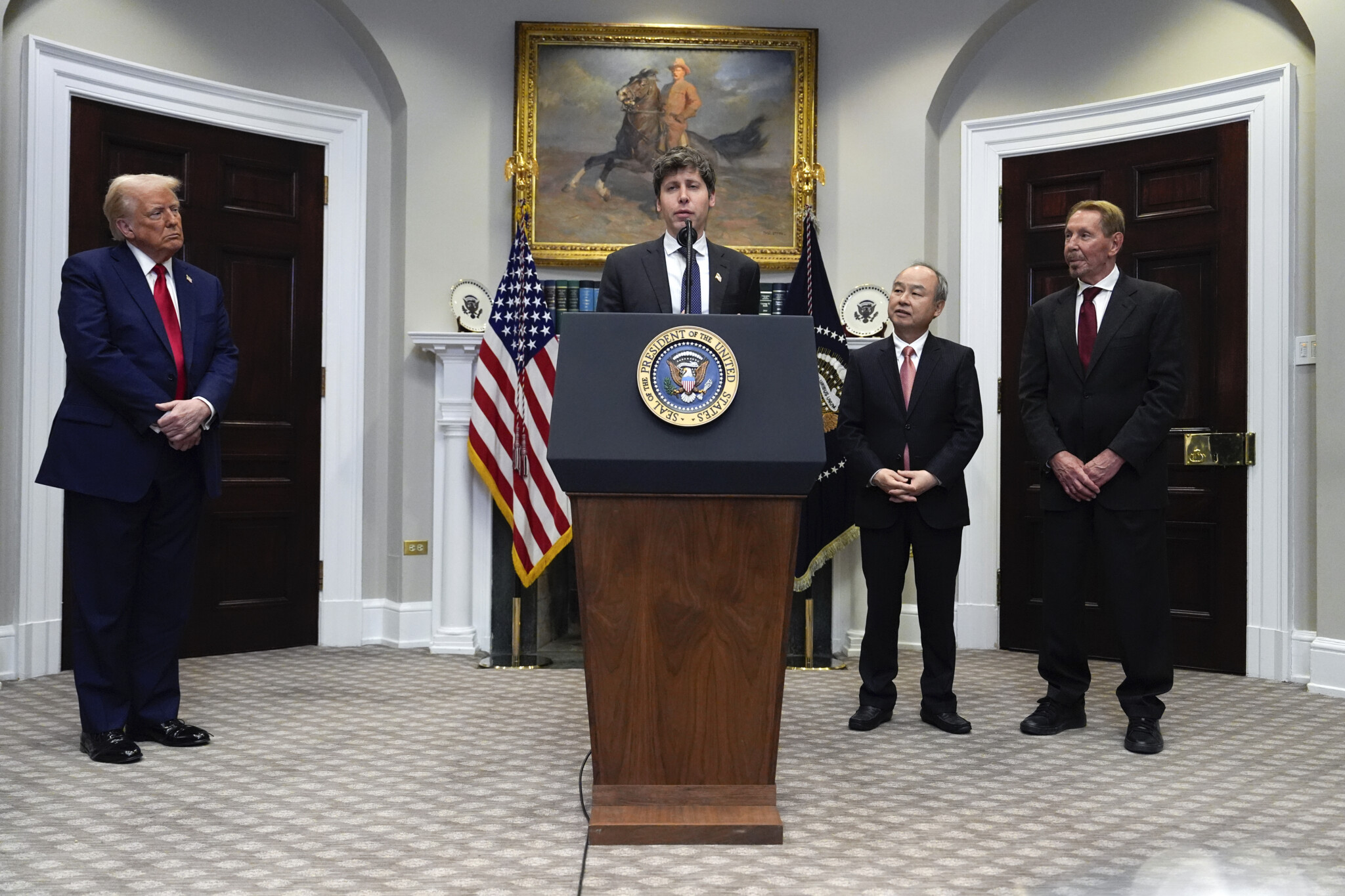Rudyard Griffiths: World, meet DeepSeek, China’s AI answer to American tech domination

Well, that was fun while it lasted.
On January 20, the day of Trump’s second inauguration, America’s global dominance of “artificial intelligence” technology ended, spanning all of 26 short months. The culprit (or saviour depending on your POV) was the debut of the new Chinese machine learning model everyone in technology is buzzing about: DeepSeek.
It is hard to overstate the potential impact of DeepSeek on AI, U.S. Big Tech companies, and geopolitics in the months to come. It is, by every measure, a killer app that flips assumptions about the future of AI as a primarily American-led and controlled innovation and in the process, significantly levels the all-important technological race that is underway between China and the U.S.
Why is DeepSeek a game-changer in AI? Quite simply it can do as much or more than the most powerful machine learning tools created by the likes of Open AI, but with less of everything—fewer chips, less energy, fewer server farms. Yet it delivers the same or more “intelligence” to the end user at a fraction of the cost of its U.S. competitors. Its chatbot version is available online, free for anyone anywhere in the world versus $100 USD or more a month for OpenAI’s identical product. Programmers can also access its operating system as open-source software, meaning they can see how it is “thinking,” modify and share its underlying code, and even download powerful versions to a personal iPhone or computer. And finally, it does all these things using non-sanctioned chips that are readily available in China and globally.
It is easy, even for a sometimes AI pessimist like me, to get excited about DeepSeek. The first and obvious consequence of its debut is an overnight collapse of the cost of accessing high-quality AI. OpenAI’s latest proprietary model currently charges users $15 USD per million tokens (or unit of data) inputs and $60 per million token outputs. DeepSeek crushes these costs to $0.55 per input and $2.19 per output. If this Chinese company has indeed cut the cost of good quality consumer AI by “10x” then it has the potential to expand rapidly into all kinds of different processes and activities that previously would not have warranted investment, given high costs and smaller returns.
In short, we could be witnessing a radical democratization of the technology, making it much more than a tool for big business and big money.
The other immediate non-technological benefit of DeepSeek’s “great leap forward” is to radically disrupt Silicon Valley’s global AI monopoly. For the last 26 months, since the arrival of OpenAI’s first chatbot in November 2023, a handful of American companies have dominated machine learning and its commercial applications. This was the result of the massive cash investment, numbering now in the hundreds of billions of dollars, required to purchase millions of advanced chips, build massive data processing centres, and secure large and abundant supplies of energy.
These activities required vast amounts of capital accessible to only a handful of big tech oligopolies—like Google, Microsoft, and Meta—who have been richly rewarded by investors due to the lack of credible AI competitors who could function at the required scale. U.S. government bans on the sale of high-end microprocessors to China further entrenched the view that America and its Tech Titians alone would dominate the commanding heights of AI technology, potentially for years to come.

Sam Altman, OpenAI CEO, speaks alongside President Donald Trump, Masayoshi Son, SoftBank Group CEO, and, Larry Ellison, chairman of Oracle Corporation and chief technology officer, at the White House, Tuesday, Jan. 21, 2025, in Washington. Julia Demaree Nikhinson/AP Photo.
In a move right out of Sun Tzu’s The Art of War, China quietly cut the feet out from under America’s global AI monopoly, and on Inauguration Day no less (talk about cheek!). Specifically, by demonstrating state-of-the-art machine “intelligence” can be achieved at one-tenth the cost to the end user while requiring a fraction of processing power, DeepSeek pulled off the equivalent of a digital Pearl Harbor, blowing up the competitive moat protecting U.S. AI dominance while rendering export bans on microchips all but obsolete.
Setting aside for a moment the geopolitical implications of this singular event in the early history of AI, there is genuine cause for celebration. The innovations pioneered by DeepSeek open up the possibility of much more competition in AI with smaller companies challenging the big U.S. incumbents on price, transparency, and functionality. More importantly for a country like Canada, the technology DeepSeek has made available free to the world opens up the transformative benefits of machine learning to smaller nations and economies that don’t have gargantuan tech companies and America’s deep capital markets, or what just a few weeks ago were towering barriers of entry to obtaining state-of-the-art AI. In this vein, investors in “Mag7” are already thinking hard about DeepSeek’s impact on sky-high tech stock valuations and the fate of trillions of sunk capital if U.S. companies have lost their pricing power when it comes to providing the world with high-grade consumer AI.
It is also worth considering some of the risks, if not outright threats, that flow from DeepSeek’s debut. This is undoubtedly a massive soft power win for China as it seeks to entrench the tool as a powerful, efficient, and most importantly cheap AI alternative in the global south and elsewhere. Make no mistake about it, you will not be able to generate from the Chinese chatbot anything approaching a balanced summary for the search parameter “Taiwanese independence” or “Tibet nationhood,” for example. Like with TikTok, we have no idea of how DeepSeek is editorially and otherwise controlled by the Communist Party of China.That said, it is not as if the AI chatbots of large U.S. tech firms are models of transparency, accountability, or ideological balance.
The other risk I will be watching is how the Trump administration reacts to China’s AI breakthrough. From EVs to critical minerals to microchips to solar panels, America is increasingly quick to either ban or tariff technologies that threaten domestic incumbents. These very same firms are adept at special pleading for protectionist policies to entrench what in many cases are outright oligopolies. Open AI’s Sam Altman, like any good Silicon Valley CEO, is already courting massive government subsidies (e.g. Stargate) and musing about the need for homegrown AI champions.
If DeepSeek turns into the OpenAI killer that some tech commentators are predicting, expect a ban on Chinese AI chatbots in 2025. This would be bad for consumers, bad for innovation, and entrench unmerited American “Big Tech” oligopolies. In a worst-case scenario, Canada and other “allies” may be coerced into banning innovative and inexpensive Chinese AI in order to get access to U.S. markets.
Love it or hate it, DeepSeek shows that the disruptive effects of machine learning are far from over. The certainties of a week ago can be overturned with the arrival of a new innovation or breakthrough. Once powerful incumbent companies and governments can find themselves suddenly playing defence. All this change ultimately has to be for the good. AI is following at breakneck speed the path of so many other human innovations, from steam power, electricity, and the original microchip—that of relentless diffusion and democratization.
Related
EU denies picking on US tech giants, says US also…
BRUSSELS (Reuters) - Europe's new tech rule aims to keep digital markets
H-1B Visa 2025: How and why US policy shift may…
Recent changes in US H-1B visa policies have sparked significant concern within the Indian IT professional community hoping to work in America. However, the a
Alibaba Group (BABA) Stock: Chinese Tech Giants Gain $439 Billion…
Chinese tech stocks have gained over 40% this year, adding $439 billion in valueChina’s “7 titans” are outperforming the US “Magnificent Seven” tech s
The Global Spread of Protectionist Policies That Squeeze American Tech…
An increasing number of countries in recent years have begun targeting America’s leading technology firms with policies touted as measures to promote fair com















